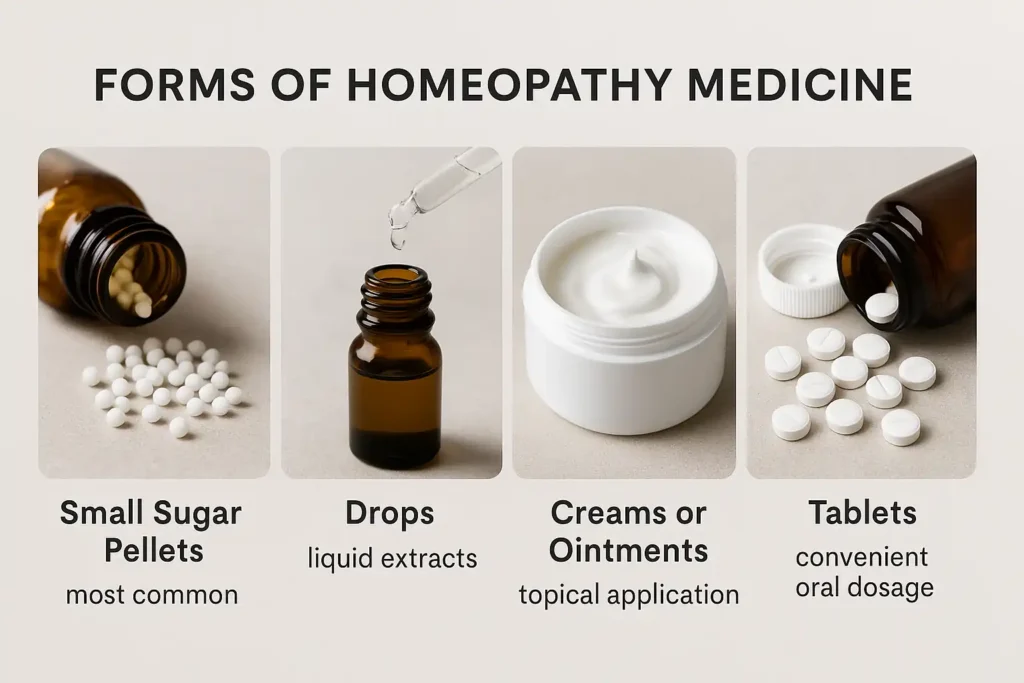What is homeopathy? If you ask this today, you’ll find two kinds of answers. Supporters call it a safe and gentle form of healing. Critics call it unscientific. But one fact is clear: millions worldwide still use it.
To understand how homeopathy works, we need to go beyond myths and dive into how it started, how it is practiced, and what modern research really says.
What is homeopathy?
The homeopathy meaning is rooted in the Greek words homeo (similar) and pathos (suffering). In plain terms, it means “treating illness with something that produces similar symptoms in a healthy person.” This principle is often called the like-cures-like principle.
The concept dates back to the late 18th century, when German doctor Samuel Hahnemann grew disillusioned with the severe medical methods of his era, such as bloodletting, mercury treatments, and potent purgatives.
He noticed that substances causing illness-like effects in healthy individuals could, when given in much smaller amounts, ease similar symptoms in sick people. This observation became the cornerstone of what we now call homeopathy.
Examples of like-cures-like in practice:
- Coffee, which causes insomnia in large doses, is given in a diluted form for sleeplessness.
- Onions, which trigger watery eyes and runny nose, are used in diluted form for colds or seasonal allergies.
- Arnica, a plant known to cause irritation when raw, is used in diluted form for pain, bruises, or swelling.
Homeopathic medicine is not prepared like regular drugs. Remedies are made from a wide variety of sources; plants (belladonna, arnica), minerals (sulfur, mercury), or even animal-derived substances (bee venom, oyster shell).
Once the raw material is chosen, it undergoes a process called potentization:
- The substance is dissolved in water or alcohol.
- It is then shaken vigorously (succussion).
- The process is repeated many times, sometimes until the original substance is diluted beyond detection.
By the end, remedies may be so diluted that no molecule of the original source remains. Supporters say what is left is an “energetic imprint” that stimulates the body’s healing response.
Forms of homeopathy medicine include:
- Small sugar pellets (most common)
- Drops
- Creams or ointments
- Tablets
Unlike conventional medicine, where one disease often has a standard drug, homeopathy treatment is much more individualized.
When you visit a homeopathic practitioner, they will not only ask about your physical symptoms but also your mood, appetite, fears, sleep patterns, and even life stresses.
For example:
- Two patients with migraines may receive completely different remedies. One may be prescribed Belladonna if headaches come with redness and heat, while another may get Nux Vomica if headaches worsen after stress and rich food.
This personalized approach is why many patients feel deeply understood in homeopathic consultations. It is also the reason homeopathy is often seen as holistic healing, because it addresses both body and mind.
How is homeopathy believed to work?

The big question: what is homeopathy and how does it work?
Practitioners believe diluted remedies trigger the body’s natural healing power. This is why homeopathy is often linked with holistic healing. The emphasis is placed not solely on symptoms but on the individual as a whole; considering body, mind, and lifestyle.
Critics argue that remedies are so diluted that no chemical activity is possible. Supporters say the process leaves behind an “energy imprint.” Modern science calls this claim controversial.
Some researchers say the results may be linked to the placebo effect, the power of belief itself. But patients often report real improvement, especially in long-term conditions.
So, while science demands more evidence, people’s lived experiences keep the debate alive.
Conditions homeopathy is commonly used for
People often turn to homeopathic medicine for everyday and chronic conditions:
- Allergies and hay fever: Remedies such as Allium cepa (onion) or Sabadilla are commonly used to alleviate symptoms like sneezing, watery eyes, and nasal discharge.
- Asthma and respiratory issues: Used to reduce frequency and severity of attacks, often alongside inhalers.
- Colds and flu: Remedies may shorten recovery time or reduce congestion and sore throat.
- Headaches and migraines: Options differ depending on triggers: Belladonna for throbbing pain, Glonoinum for heat-induced headaches.
- Skin problems: Sulfur for eczema, Graphites for dry cracked skin, Natrum mur for acne linked with hormones.
- Digestive issues: Nux Vomica for acidity from spicy food or alcohol, Carbo vegetabilis for bloating.
- Mental health support: Remedies for stress, phobias, grief, or sleep issues. While not a replacement for psychiatric care, many people use it as complementary therapy.
In some countries, homeopathy is used in hospitals as part of integrative medicine, working alongside standard care. It is seen not as a cure-all but as a form of complementary therapy that may support overall well-being.
Is naturopathy the same as homeopathy?
The short answer: No.
A common confusion is between naturopathy and homeopathy. Although both are classified under traditional medicine practices and both emphasize natural remedies, they are quite different.
- Homeopathy: Focuses only on the “like cures like” rule and uses highly diluted remedies.
- Naturopathy: Broader approach that includes diet, exercise, detoxification, herbal medicine, and lifestyle counseling.
A person with chronic fatigue, for example, may get a personalized sugar pellet in homeopathy. In naturopathy, they might get dietary changes, herbal tonics, and stress-management exercises.
Knowing the difference helps patients make better choices, especially if they’re seeking individualized treatment or a broader lifestyle change.
Should you try homeopathy?
Here’s where people get stuck. Should they try it or not?
The first rule: do not replace life-saving drugs with homeopathy. It cannot treat cancer, severe infections, or emergencies.
But as supportive care, many find value. For instance:
- A person with asthma may still need an inhaler but can use homeopathy to reduce attacks.
- Someone with skin issues may avoid steroid creams by using remedies that calm flare-ups.
The appeal lies in its gentle approach. Medicines are safe even for children and elderly, since they are highly diluted remedies. Patients also feel heard, since practitioners take time to understand their lifestyle.
On the other hand, the lack of strong scientific proof is a red flag. Most large studies show mixed or placebo-level results. Still, in places like India, Germany, and South America, millions rely on it as part of daily care.
So, should you try it? The safe answer is: yes, if your condition is mild and you want complementary therapy. But for life-threatening conditions, never depend on it alone.
The Bottom Line
Homeopathy sparks endless debate. Some see it as natural remedies that support health gently. Others dismiss it as unproven.
The truth lies in balance. It may not be a cure for all diseases, but it continues to help many manage symptoms, improve comfort, and feel cared for.
If you’re asking, does homeopathy work, the honest answer is: sometimes. Its strength is in mild conditions, chronic health support, and patient comfort. Its weakness is lack of scientific backing for serious diseases.
In the end, the system survives because it speaks to human psychology as much as to physical health. That’s why even in the modern age, homeopathy is one of the most used alternative medicine systems worldwide.
FAQs
What is the difference between homeopathy and Ayurveda?
Ayurveda uses herbs, diet, and lifestyle changes. Homeopathy uses the like-cures-like principle with highly diluted remedies. Both are traditional medicine practices but follow very different methods.
Is homeopathy better than allopathy?
Not really. Allopathy relies on proven drugs and fast action. Homeopathy is slower, gentler, and works best as complementary therapy rather than replacing strong modern treatments.
Who uses homeopathy the most?
It is most popular in India, Germany, France, and Latin America. Families often use it for children, chronic issues, and everyday discomforts where mild, natural care feels safer.
What is the success rate of homeopathy?
There’s no fixed number. Studies show mixed results. Some patients find clear benefits, others no effect. Much depends on condition, belief, and proper use by a homeopathic practitioner.
Is homeopathy ayurvedic?
No. Homeopathy started in Germany in the 18th century. Ayurveda began in India thousands of years ago. Both are natural remedies systems but with very different foundations.
Does homeopathy have side effects?
Most remedies are safe due to high dilution. But wrong self-medication or replacing urgent care with it may cause harm. Always consult a certified homeopathic practitioner before starting.
How do I choose a doctor for homeopathy?
Check if the doctor is certified, experienced, and well-reviewed. A good practitioner should spend time asking about your body, habits, and mind for individualized treatment.
Is homeopathy scientifically proven?
Not fully. Some trials show positive results, others find no more than placebo. Current research suggests benefits in mild chronic conditions but lacks strong evidence for severe illness.
















Leave a Comment